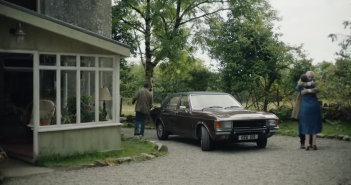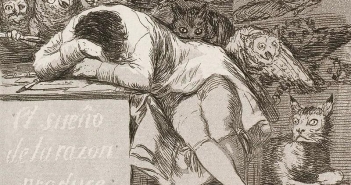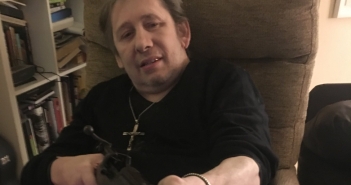I have been to four of Bob Dylan’s concerts in various places around the world, and bar one where Ronnie Wood lightened the misery in Kilkenny, they were uniformly awful. He persists in reinterpreting and mangling his great songs, and hardly engages with the audience.
It begs the question: why does he persist with the Never Ending Tour? Perversity possibly? Boredom? What else can I do? I might as well stick to my guns and my art? Nothing else to do?
The opening paragraphs of this article are of course an irrelevance. He is not a performer in the mould of Springsteen, nor has he really ever been, apart from the tours in the 1960s, with what became The Band and a brief shine of light in the 1970s with The Rolling Thunder Review, where he had ample support. So what. It is irrelevant to his legacy. He is the greatest creative artist of the twentieth century and we are lucky to still have him with us.
He is also one of the great cultural commentators of our time, and has been for an unprecedented fifty years, except for a period in the 1980s when he seemed to be going to seed. But the wake up call of a near-death experience (form histoplasmosis) has led, since Time Out of Mind in 1997, to an unprecedented bout of creativity.
Yet since Tempest (2012), apart from a typically immersive and at times brilliant mining of the Great American songbook (all five albums worth) – a bit like the late Picasso turning to the great works of the high Renaissance and tearing them to figurative pieces – there has been no sign of new material. It would seem strangely fitting if the man who, as Steve Earle puts it, invented the job of singer-songwriter were to see out the autumn of his years crooning along to the same Brill Building standards that he had once made seem so trite.
Now with a unique sense of zeitgeist opportunism, Dylan has released a new seventeen minute-long song, ostensibly about the murder of John F. Kennedy, but which is also a travelogue through American cultural history, with Prince Hamlet and the great, deranged 1960s American DJ, Wolfman Jack, as our guide.
A minefield and a summation. In a sense he quite clearly thinks that the killing of Kennedy was committed by the alt-right and the Texan Hunt family, and that the murder indirectly got us to the point of despair in politics where we have arrived. But his new song, Murder Most Foul, is so much more than a mere ‘protest song’, another genre that Dylan briefly defined before discarding in his early twenties.
Set to Dylan’s own gentle, rippling piano, and accompanied by minimal bowed bass, violin and occasional flourishes of percussion, the performance has echoes of his surrealist masterpiece from the early 1980s, ‘Angelina’, as well as the epic ‘Last Thoughts on Woody Guthrie’ (1962); more of a recitation than song.
Judging by the subtle arrangement and the mellow tone of Dylan’s voice – closer to that heard on the recent Sinatra ballads records than the ravaged croak on display on Tempest – it seems safe to say that it was recorded, presumably in one take, between recent concert performances.
As the piece slowly builds in intensity, Dylan moves from the horror of Kennedy’s death, through The British Invasion and on to Woodstock and Altamont, from the Age of Aquarius to the Age of the Antichrist, before finally offering some hope in dark times through the things he knows and loves best.

Wolfman Jack in 1979.
Conjuring the incantatory spirit of his old friend and admirer, Allen Ginsberg, Dylan rhapsodises ‘Oh Wolfman, Oh Wolfman, Oh Wolfman, Howl!’, imploring the DJ to play everything from ‘Art Pepper, Thelonious Monk,/ Charley Parker and all that junk’ to Fleetwood Mac, from Buster Keaton to The Who, from Warren Zevon to Queen, from Beethoven to Civil War hymns. Dylan’s playlist is a litany of popular culture, fragments shored against ruin.
Nobel Prize for Literature
Dylan’s Nobel Prize for Literature was thoroughly deserved. Yet no one saw it coming. Witness the somewhat shell-shocked reaction in Stockholm.
Predictably, the great bard of Duluth evaded the glare of publicity, almost sparking an international incident by not responding to the award. Given the great and indeed meditative creative artist he is, I suspect he felt he was undeserving and could not compete with Hemingway and the others he references in a moving acceptance speech, which demonstrated an innate modesty as well as an acute understanding of the American canon.
I believe his greatness lies in a total lack pretentious. To see him accept the Congressional Medal of Honor from Obama was to witness a wayward little boy seemingly wondering why everybody appreciated him so much. You can also see his pride in being an American; a proper American. There is also an obvious disapproval of how these flickering political shadows interfere in such a great life. Yet an inner dignity too, and truthfully a man who deserved it and knows it.
Early Days
Dylan is a spokesman for the Baby Boomer, Woodstock generation. The great soothsayer of the 1960s who knew that change was coming, and that a new generation would not submit to the will of their elders any longer. Yet we find a concern with the growing materialism, obvious from the outset in destroying the goodness in America. This is evident in ‘Like a Rolling Stone’ (1965) with the diplomat carrying his chattel woman on his arm like a Siamese cat.
There are also the early political songs such as ‘Masters of War’ (1963), responding to the potential of a nuclear apocalypse, and sense of outrage at the treatment of African-Americans in ‘The Lonesome Death of Hattie Carroll’ (1963).
His civil liberty credentials and intellectual engagement by this stage, circa 1963, are clearly evident. But other political songs came later. There is the true raging in Desire of ‘Hurricane’ (1975), which is the great theme song of the Innocence Project, although Ruben Carter may not have been entirely innocent.
But in its grasp of Americana the song is cinematic in scope and sweep.
Pistol shots ring out in the bar room night…
An innocent man in a living hell.
But one time he coulda been the champion of the world.
So enough has been said of his support of the Civil Rights movement, his hatred of superficiality censure, and his highlighting of injustice more generally.
Finding God
And then he embraces God after a hiatus with a motor cycle. This led to an enforced absence and some inconclusive albums. Yet the songs are full of dread of a mighty reckoning coming, such as ‘A Slow Train Coming’ (1979). A deadly reckoning. And that we all have to serve somebody. Pay our dues or penance.
This is not the embrasure of Republican religious fundamentalism, but the lack of values in a godless universe that he clearly despises.
The indirection of middle age, before the health scare has now been replaced with an autumnal clarity from perhaps the last great humanist artist. There is a clarity of precise observation, just as the light appears to be dimming in society more widely.
‘Not Dark Yet’ (1997) is one of his finest songs. It is Beckett-like in its profundity. There is a sense of closure, indicating it is not dark yet, but we are getting there. There is an uplift of hope and determination that one must go on. It is not dark, but it’s getting there.
There is hardly a person on this planet that has seen more of it, and who has so much understanding of what Isaiah Berlin called ‘the speckled timber of humanity.’ Over the past decade he has mainly responded with a creative silence that speaks volumes.
Tempest (2012) is a flawed masterpiece. The much-derided song about John Lennon is intended to convey that an age of optimism has passed.
Full of utter unbridled fury, and set to a classic Muddy Waters riff, ‘Early Roman Kings’ is a splenetic howl of rage at all that has gone wrong:
They’re peddlers and they’re meddlers,
They buy and they sell,
They destroyed your city,
They’ll destroy you as well,
They’re lecherous and treacherous,
Hell-bent for leather,
Each of ’em bigger
Than all men put together,
Sluggers and muggers,
Wearing fancy gold rings,
All the women goin’ crazy
For the early Roman kings
Dylan’s classic Middle American decency and his sense that all has fallen apart has been coming for a while.
New Track
Out of the blue and out of this lasting silence. I sense Dylan is not winding down at all. Perhaps, like Rembrandt and Ozu, he is just approaching his very best work in the late Autumn.
Though the shooting match is all over, he perhaps senses limited opportunities are left to make a difference or to intervene. But this disturbing, strangely beautiful song is like an interruption of his work routines. He realises it is now or never for the summation of the great American bard. Finally he has to condense the American tradition of genius, and say how political evil is destroying it.
In judicial terms, it is a summing up. Of a world gone wrong.
The slow train has arrived and it is dark. Not dark perhaps yet but closer than you think.
The fool in King Lear has spoken to the world leadership and the assessment is unsparing.
The day that they killed him, someone said to me, “Son
The age of the Antichrist has only begun.”
Air Force one coming in through the gate
Johnson sworn in at 2:38
Let me know when you decide to thrown in the towel
It is what it is, and it’s murder most foul
What’s new, pussycat? What’d I say?
I said the soul of a nation been torn away
And it’s beginning to go into a slow decay
And that it’s 36 hours past Judgment Day.
This article contains contributions from Dr Francis Leneghan.




